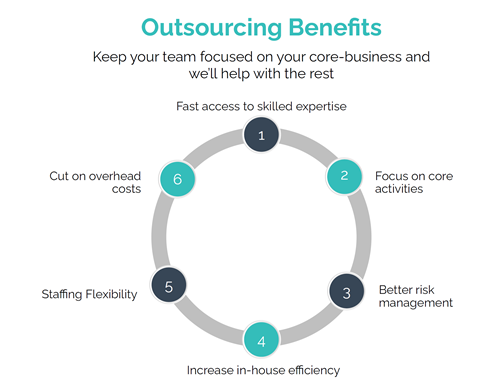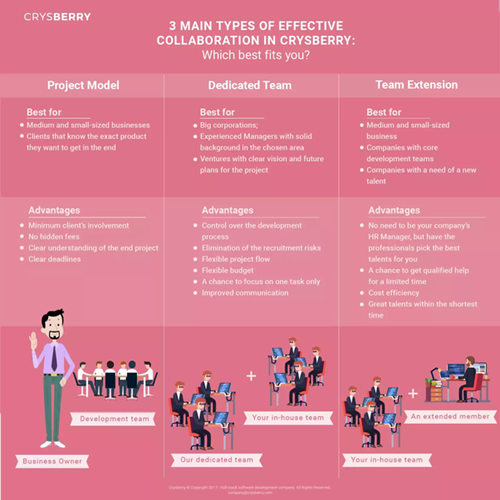In recent times many corporations face the challenge of nurturing and retaining a skilled workforce in the software industry. This usually comes at a hefty price spent on training, culture and human resources management in order to maintain a competitive environment flexible enough to easily adapt to market fluctuations and requirements.
An effective remedy to tackle this issue is to outsource some of the work to experts who specialize in the problem you’re trying to solve. This mindset has seen some rapid growth in recent years, and for good reason. According to Statista, the IT services market has grown by around 200 billion dollars since 2008 and is forecast to grow by another 110 billion between 2019 and 2021.
The graph below shows the total contract value from the IT outsourcing market worldwide from 2000 to 2019. (Source: Statista)

What is outsourcing?
“Focus on playing to your strengths, entrusting everything else to others and be surprised to see your business increase as a result.”
Outsourcing is the practice of transferring portions of your work to external suppliers rather than completing it internally, allowing you to focus exclusively on your core business functions. In some cases, outsourcing is the answer for companies who are not capable of performing certain specific tasks. It’s simply hiring help outside of the company to manage a part of the business.
Outsourcing software development is a type of outsourcing where a company hires a third-party to offer services related to software development projects. Nowadays, around 64% of all companies outsource their software application development, and the IT outsourcing trend is expected to grow in years to come. (source: Statista)
Why does a company choose to outsource IT services?

IT services are outsourced by companies for many reasons:
Save time and money, more flexibility
The first reason why companies outsource their software development process is the potential to realize cost savings through economies of scale. Following the research made by Deloitte, 59% of companies outsource to reduce or control costs.
The cost of hiring and training software developers for the short-term can be very expensive. You need to invest a considerable amount of money as well as time to develop skilled programmers in-house. By outsourcing, you save both that you can use to do something else. Moreover, you have more flexibility: you can augment your team and gain in quality service without spending time on recruitment and you don’t have to sustain long term employment.
Greater focus on core activities and increase in-house efficiency
Moreover, outsourcing is the best way to enhance productivity without compromising quality. That can help your business to shift its focus on your core activities without overwhelming your staff with work that doesn’t match their skill level. Outsourcing non-core activities can improve efficiency, streamlining and productivity because the outsourced team performs these smaller tasks better than the team itself. Furthermore, you can expand, downsize and re-prioritize your essential tasks easily without impacting your core business. For example, if you have a tight deadline, you can decide to outsource a part of your project outside of the company.
Fast access to skilled expertise and latest technologies
By outsourcing, you also get access to a large pool of talents all over the world. With the rapid expansion of technology, it cannot be possible to find expertise in every skill and technology in-house. With this issue, you can have fast access to an expert third-party and you can expand your technical capability and horizon. Additionally, you improve the quality of your final product. Most of outsourced IT companies have accumulated technical expertise from a variety of clients. That can give the opportunity to implement new projects.
Better risk management
Software outsourcing is like an investment portfolio, you need to diversify it rather than putting all in the same place. Software outsourcing is critical to an organization for long-term viability. By outsourcing, you reduce inherent project risks and boost your product’s security. Some risks need to be taken to grow your business and attain higher goals.
The most common disadvantages of outsourcing are the loss of control and barriers in communication but you can schedule regular meetings and a predefined timeline to keep a view on the part of the outsourced project.
Software outsourcing models
Outsourcing comes in a number of engagement models. Each structure defines the relationship between the client and the outsourcing partner. It determines the level of responsibility and involvment in the project as well as the expectations from the third-party to make the most of this collaboration. There is no best model, it depends on the needs and situation of each company. So, it’s useful to understand the different outsourcing engagement models and which is the best to apply to your business.
At Incredible Web, we have identified three software outsourcing models which have proven to work best for our client when it comes to outsourcing their development, maintenance and testing of a software product.
These models are based on three main approaches:

source: Crysberry
STAFF AUGMENTATION
It’s the simplest form of software outsourcing models. Staff augmentation is when a team is extended by a number of people who fill in for the skills and knowledge that might be lacking in your in-house team. In some cases, it could also be a simple matter of increasing the capacity of your team for a specific period of time.
The augmentation model is aimed at complementing the core part of the in-house team, it’s a valued contribution to the company. This process of hiring a third party can help companies with cost-saving. Extending a team adds skilled resources to your in-house team on a short or long-term basis. Moreover, this model reduces the time spent on recruitment and there is no location boundary. You maximize the efficiency of your in-house team while retaining total control over your project.
Dedicated team
In this model, the outsourcing provider is required to provide a set of services for low-level tasks management, process quality and resource management. The provider has partial responsibilities on the project, the provider works out the best process to be used by the team and ensures that it is followed. It is the responsibility of the provider to make suggestions to the client on project management. This model suits dynamic projects when the scope of the project is not strictly defined so requests and tasks can change at any time but there is a defined end goal.
Project-based model
In the project-based model, the outsourcing partner manages the entire development project according to the specifications and the predefined timeline. The client-company delegates full control to the software developer who has complete responsibilities and so, more flexibility to manage and execute the project. The client delegates most of the control over the team and the project’s operation, but carefully monitors progress through frequent progress reports and catchup-meetings. It’s used for projects where requirements are not likely to change during the development process.
Software outsourcing in Malta
The Maltese islands are considered as a hub for research and development in the IT sector and an attractive location for outsourcing services that require specialised skills using the latest technologies. Malta is positioned at the forefront of new technologies and the growth in Malta’s IT sector is supported by the government’s strategic economic policies. Moreover, Malta offers a qualified and multilingual workforce as well as operational costs that are lower than most other European locations. The country has established itself as a powerful outsourcing partner that is increasingly winning high-value deals and offering knowledge-intensive solutions. Malta has implemented core competencies that are growing in demand in the global outsourcing market and mainly in areas such as eCommerce, iGaming and financial services.
In recent years, the demand for outsourcing services has increased and there is a growing number of software development companies that provide specialist custom-built software and support service from Malta, such as Incredible Web. From our personal experience, the most sought after roles in the industry include: front-end development, back-end development, mobile development, cloud and devops. Get in touch with us if you're interested in outsourcing some of your work or visit our outsourcing services for more information.

